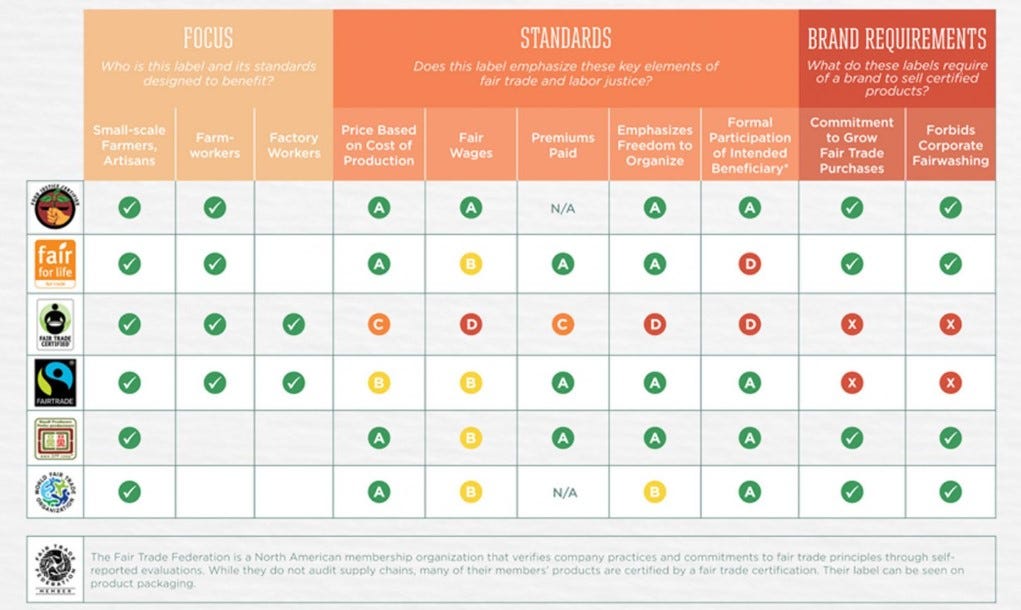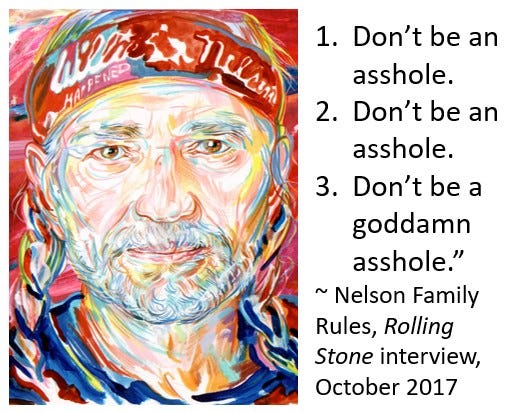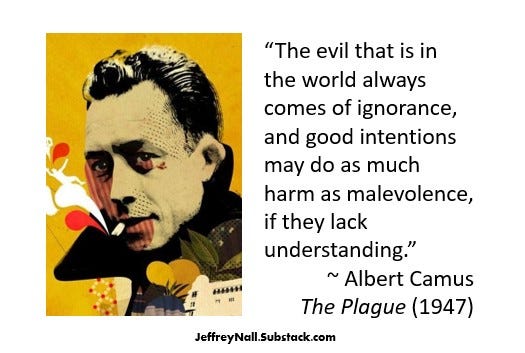Being Good Means More than Not Being an "Asshole": The Limits of the Nelson Family Rules
The third part of a series exploring the complexities of our moral lives.
Being morally good is not as easy as many presume. For one, being morally good often requires us to go against popular societal beliefs including those we might have internalized ourselves. Another common (mis)understanding of morality is that being good boils down to not actively attempting to hurt or mistreat others.
The so-called “Nelson Family Rules” expresses this well-intended but ultimately misguided vision of moral decency. As Annie D'Angelo and her husband, renowned country musician Willie Nelson, explained in an interview with Rolling Stone magazine, the rules are:
“1. Don’t be an asshole. 2. Don’t be an asshole. 3. Don’t be a goddamn asshole.”
Thinking of moral decency this way upholds the mistaken notion that being good is as easy as not consciously mistreating others. But moral goodness means more than the absence of intentional wrong-doing. While it’s true that being good does require us not to unnecessarily harm or mistreat others, moral goodness requires more.
If we reflect on the times we have hurt someone, we will realize it was usually not intentional. A lot of the time, the hurt we cause is due to carelessness or ignorance rather than outright enmity. But that fact does not negate the hurt or harm our ignorance or carelessness caused. As Albert Camus observed in his novel, The Plague, “The evil that is in the world always comes of ignorance, and good intentions may do as much harm as malevolence, if they lack understanding.”
I can offer a helpful example from my experience as a parent. There have been times when a child of mine accidentally hurt a sibling or damaged something that did not belong to them. They might have, for example, forcefully moved their body in a space where someone else was present. Their body might have slammed into someone, causing them to cry out. The predictable defensive reaction of the guilty part is, “I didn’t mean to!”
My standard reply is something like this:
Of course you didn’t mean to. You’re not a mean person. We know that. If you had intentionally hurt someone without any reason then you’d be in very big trouble. But the fact you didn’t mean to hurt your sibling doesn’t get you off the hook. You still did something that was wrong. You didn’t make the effort to take them into consideration when you were playing and doing what you wanted to do.
In the adult world we might consider something like discovering that our favorite brand of chocolate has been made using forced child labor. As with the child in the above scenario, we might declare that we had no intention of rewarding a company for using human exploitation to satisfy our sweet tooth. “How were we to know!,” we might ask, indignantly.
But someone could reasonably challenge us by asking why we had not done the necessary research to ensure that the goods we were buying met at least minimum ethical production standards. After all, as much as some of us love our sweets, we know quite well that we do not need to eat chocolate. We might want to complain that such an expectation is too burdensome, but reflection will have us realize how much such rationalized deflections are reminiscent of the child’s in the previous scenario.
Educated adults, it could be argued, ought to be informed consumers who know something about ethical food labeling systems, and should do their best to ensure as many of their non-necessary goods are “fair-trade” certified as possible.

To be clear, I am not arguing that consistently purchasing fair-trade goods is easy or even possible. These products are not only more expensive—but not always as much more expensive as assumed—they are sometimes simply not available. I am also not overlooking the fact that many are simply unaware of the abuses workers in agricultural sectors such as sugar cane and cocoa are subjected to.
The difficulty of making ethical choices and being adequately aware of the harms we contribute to reinforces the point that being a good person requires more from us than simply not being malicious (“assholes”). Being good requires active, conscious effort to remain aware of the seen and unseen web of human relations we participate in.
being morally good… means that we take up the challenge of developing a character of moral self-awareness, carefully contemplating how much our lives and actions are connected to others and obtaining the knowledge necessary to make informed ethical choices.
The wrong of unintentionally hurting someone in our circle of relations, be they a sibling in shared space or worker making the goods we enjoy, is a failure to adequately factor others’ interests into our actions. We must do more than not intentionally hurt others to achieve moral goodness. We must also combat our egocentrism. That is to say, we must also develop a disposition of mindfulness that helps us remember we aren’t the only ones in the world, and that we are responsible for considering how our actions may impact others.
Moral Forethought
It could be said that the Nelson Family Rules’ dictate not to be an “asshole” say just about the same as what has so far been written. I think otherwise. A morally good world requires more from us than to simply stop being “jerks” or “assholes.” (And even that much is difficult since, as Willie Nelson mentioned in the same Rolling Stone interview, everyone in the family had violated the third rule not to be a “goddamn asshole.”) Such a view of our moral lives overlooks just how easy it is to think and behave egocentrically, taking our desires, interests, beliefs, and impulses for granted without sufficient consideration of others.
If we are honest, most of us will admit that egocentrism comes easier and more naturally to us than empathetic, knowledgeable self-awareness. Egocentrism requires little thought or effort. Self-awareness and empathy are, by comparison, underappreciated skills that require knowledge and effort to develop and consistently implement. And being morally good means not only that we not actively dismiss or mistreat others—that we do not act like assholes. It also means that we take up the challenge of living mindfully aware that there are few crimes the malicious have committed that were not first done by the ignorant or well-intended.
If you enjoyed this post please share it with others and like it by clicking the heart icon. Be sure to subscribe if you haven’t already.
Invite Dr. Nall to Speak
Dr. Nall delivers energetic live presentations and engaging workshops on the subjects featured in Humanities in Revolt. Those interested in booking a workshop or talk can get in touch through Facebook or by leaving a comment.






To someone who claims, “l didn’t mean it,” I say, “you didn’t mean NOT to.”
“That’s not what I meant,”
Do what you mean to do, next time. You are responsible for accidents that you can prevent just by making an effort. That’s the practice of mindfulness. We are all fallible, responsible for our own actions. The practice of mindfulness helps us to make conscious choices, fewer unintended consequences.
No one is perfect, so all we can do is practice.